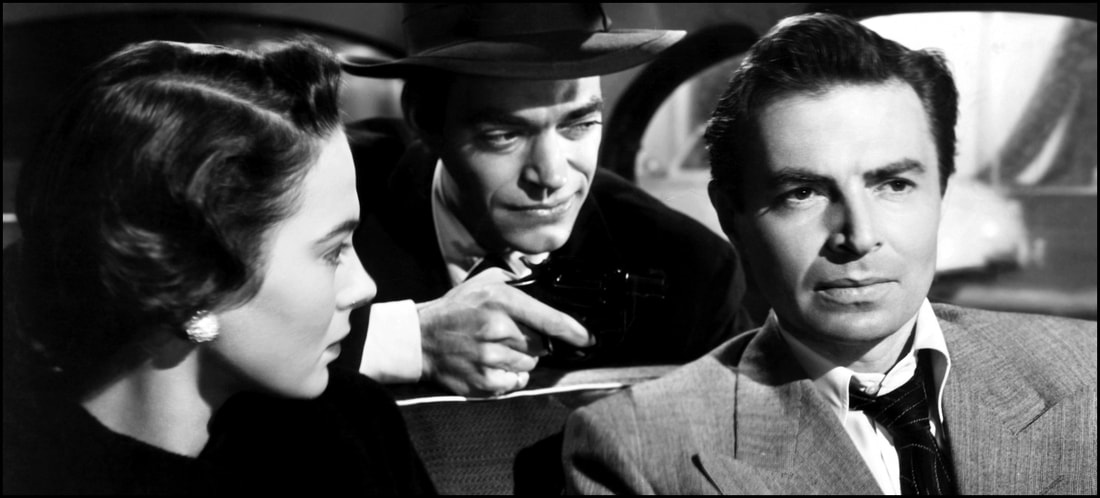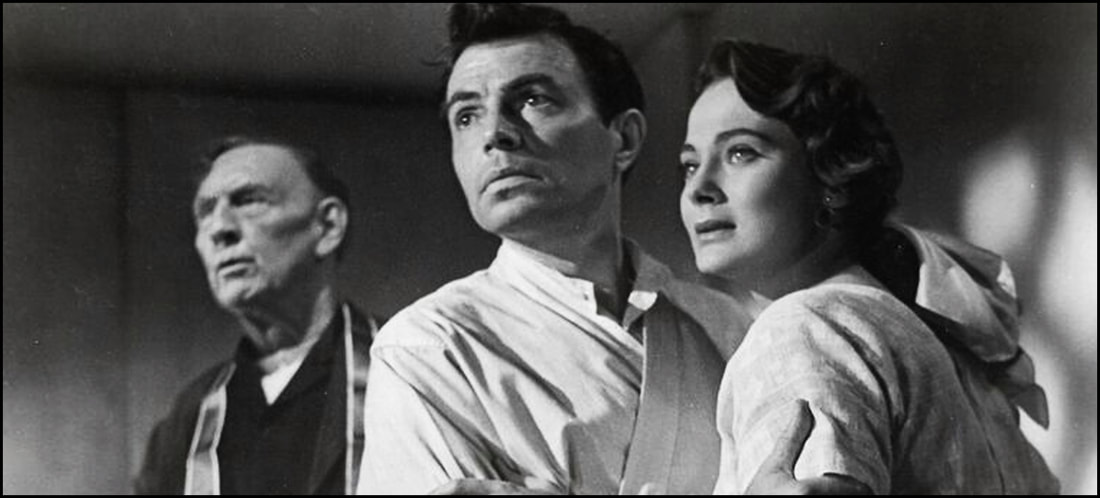Honestly, I love it for a whole lot of reasons but only one in particular that I often share with readers here: I see film noir as a black-and-white existence most often populated with broken people making broken choices, and I like to call these characters ‘monsters of a sort.’ That’s why I’ll occasionally cover noirs in this space – along with the Science Fiction, Fantasy, and Horror features – when I get the inkling, and that happens a lot when I can squeeze in the screenings.
Such is the case today as I was graciously provided a complimentary Blu-ray set by Kino Lorber: Film Noir – The Dark Side Of Cinema, Volume XIV.
Today’s viewing: 1950’s One Way Street was another pleasant surprise for an evening viewing as it’s another noir I’d never heard anything about. Directed by Hugo Fregonese from a story by Lawrence Kimble, it’s a lean and mean 79-minute drama that musters some impressive menace on both sides of the border (if you know what I mean, but if not you will soon). It stars James Mason, Märta Torén, Dan Duryea, Basil Ruysdael, and William Conrad in key roles.
(NOTE: The following review will contain minor spoilers necessary solely for the discussion of plot and/or characters. If you’re the type of reader who prefers a review entirely spoiler-free, then I’d encourage you to skip down to the last few paragraphs for the final assessment. If, however, you’re accepting of a few modest hints at ‘things to come,’ then read on …)
From the film’s IMDB.com page citation:
“After stealing a gangster’s money and his girlfriend, a doctor heads for a small village in Mexico.”
I’ve got to hand it to the people at both Kino Lorber and Universal International Pictures (UI) this morning. As of this writing, they’re an incredible fourteen sets in with their seemingly endless Film Noir: The Dark Side Of Cinema home video releases, and they’re still producing some pictures that I’ve never heard of (not that I know all), that are truly quite good even though they’re dated, and that continue to demonstrate why noir – of all sub-genres – grew to prominence and continues to influence audiences and storytellers so many decades later.
And about One Way Street?
Those who’ve read any number of my ‘Monsters Of A Sort’ columns likely know that I’ve had to kinda/sorta redefine my expectations over the years as to what constitutes a legitimate film noir. Frankly, I think it’s a sub-genre that’s been misunderstood by many, and that sentiment applies to me as much as the next person. Initially, I’d always known about the preferred time period, but I’d been told many moons ago (by a college professor) that one requirement was that all of a film’s characters had to (essentially) be either evil or riddled with human flaws. Now that I’m older, thinking for myself, and continuing to grow my own knowledge of film and its legacy, I know that definition was never quite correct, but I still fall back on it from time-to-time when I think I’ve found a particular release that fits. Fregonese’s One Way Street most decidedly does, and it does so very well.
What I think works so well in Street is that Mason pretty consistently underplays everything. Even when he’s clearly caught up in tension and/or jeopardy, he maintains a level of calm that one expects from a man of medicine. Never jumping to rash conclusions because he’s already thought things through, he avoids the usual trappings of genre characters visibly vacillating between right and wrong; once he’s made his decision, he goes through with it, and this gives the film a degree of freshness rarely seen in noir (based on my experience).
Similarly, Street benefits from a similar temperament displayed by Father Moreno (Basil Ruysdael). A man of the cloth, he spends his time amongst the poor rural folks of Mexico, but – as he’s learned that the country can be a dangerous place – he isn’t above telling a white lie here and there if it’ll keep himself and those around him free from marauders and bandits. He’s a knowing yet wry performance, and – like Mason’s clear-headed physician – that isn’t something one sees in a great deal of crime dramas.
But, alas, not all is perfect in this Street, and that’s most likely because the format almost always requires a bad ending for most if not all of the principles. I found what happened in the final reel to be a bit uneven precisely because I’d been somewhat distracted by these surprisingly engaging characters, causing me to take my eye off the road, so to speak. In a world wherein both good deeds and bad deeds extract a price, I guess it’s safe to say that no one gets out alive … especially when something resembling redemption is so close within one’s reach.
That, my friends, is the stuff of the best noirs, and I think it applies here quite well.
One Way Street (1950) was produced by Universal International Pictures (UI). DVD distribution (for this particular release) is being coordinated by the good people at Kino Lorber. As for the technical specifications? There’s no indication on the product package that this pressing received any new updates/upgrades, but – though I’m no trained video expert – I thought the sights and sounds here were very good. Lastly, if you’re looking for special features? The disc boasts the theatrical trailer as well as a commentary track provided by film historian Lee Gambin and Costume Historian Elissa Rose.
Highly recommended.
While I wasn’t all that enamored with our lead character’s eleventh-hour twist-of-fate, One Way Street is a surprisingly good dramatic thriller – with, yes, very pronounced noir sensibilities here and there – bolstered by a fabulous pair of winning portrayals from Mason and Torén. Be warned: it does slow down a bit in the middle third – it appears that our somewhat unlikely lovebirds may just have managed to achieve the impossible of a clean getaway – but its bookends testify perhaps to why noir-flavored flicks never quite go out of style … they simply tuck their sad sack of a head between their legs, lay low, and wait for the right opportunity to come back again.
In the interests of fairness, I’m pleased to disclose that the fine folks at Kino Lorber provided me with a complimentary One Way Street (1950) – as part of their Film Noir: The Dark Side Of Cinema XIV collection – by request for the expressed purposes of completing this review. Their contribution to me in no way, shape, or form influenced my opinion of it.
-- EZ



 RSS Feed
RSS Feed